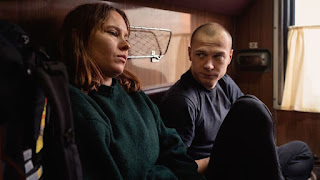In Compartment No. 6, a Finnish production set in Russia during the 1990s, a young woman takes what begins as one of the worst train rides in history.
Laura (Seidi Haarla) hails from Finland and studies language and archeology in Moscow. To supplement her studies, she wants to see the Kanozero petroglyphs, 5,000-year-old rock drawings located in north western Russia.
Before departing, Laura attends a party hosted by the woman she regards as her girlfriend (Dinara Drukarova). The two were supposed to travel together but Drukarova's Irina bowed out at the last minute, an early sign that she has lost interest in Laura.
On the train, Laura is assigned a compartment with an unruly young Russian (Yuriy Borisov). Borisov’s Ljoha drinks, curses, and makes crude sexual advances.
Laura seeks different accommodations. The conductor, a woman who resembles a prison guard, insists that Laura remain in her second-class compartment.
Boorish and loud, Ljoha boasts about his patriotism ("Russia is a great country") and generally makes a nuisance of himself until he passes out.
Later, he’ll announce that all humans should be killed, the kind of sweeping statement you'd expect from a man with a shaved head and a major scar running down is forehead.
But this amped-up bit of misanthropy isn't what it seems: Ljoha's responding to news that a young guitar-playing wanderer from Finland has stolen Laura's camera -- after she was kind enough to invite him to share their compartment.
Borisov reminded me (at least a little) of Toshiro Mifune; he's playing a man of boisterous physicality. He's half-offensive and half-comic and it seems apparent from the outset that director Juho Kuosmanen (The Happiest Day in the Life of Olli Maki) won't be making a rom-com about two mismatched strangers who fall for each other.
That's a clue about how the movie operates. Kuosmanen subverts expectation as he explores the possibility for something approaching genuine connection.
If you've ever wondered what Russia was like in the early days of the post-Soviet era, Kuosmanen provides a good feel for a country that still seems mired in Soviet gloom. Ljoha is headed to Murmansk to work in nearby mines; Laura seems uncertain about what she's doing.
Kuosmanen filmed on trains, not in a studio, a choice that enables him to make us feel the confinement passengers experience during a journey that unfolds over several days.
The mood softens as Laura and Ljoha get to know each other and we begin to think that Ljoha might not be as awful as he first seemed.
During an overnight stop, Ljoha hot-wires a car and takes Laura to meet an older woman who dispenses advice and shares ample quantities of homemade liquor that she refers to as moonshine.
The movie’s period trappings can seem a little shocking. In the absence of cell phones, Laura makes calls from phone booths. Phone booths? Remember them?
Compartment No. 6 captures the shabby particularity of a part of the Russian environment as it must have existed in the 1990s, a time before the world seemed more homogenized.
Kuosmanen reveals character under strained circumstances, allowing Laura and Ljoha to emerge as two lonely people lost in the desolation of a dreary Russian winter.
Don’t panic, though. Kuosmanen skips past depression with two characters we slowly learn to care about and with a view of Russia that few of his ever will see particularly in these days when Russia isn’t exactly anyone’s destination of choice.

No comments:
Post a Comment